Live Simulation Reflection: Mental Health Recovery Focused Nursing
VerifiedAdded on 2022/12/23
|6
|1290
|80
Report
AI Summary
This report is a reflection on a live simulation centered around mental health recovery and its application in nursing practice. The student identifies the full-scale live simulation as a key aspect, emphasizing patient-centered practices and the development of communication skills. The reflection draws from the student's internship experience and highlights the importance of verbal communication, active listening, and the collaboration between healthcare consumers and nurses in recovery-focused approaches. The report discusses how nursing practices promote mental health recovery through self-direction, empowerment, and a holistic approach, providing examples of recovery-focused practices observed during the simulation. It also references key literature to support the student's insights and recommendations for improving mental health recovery practices.
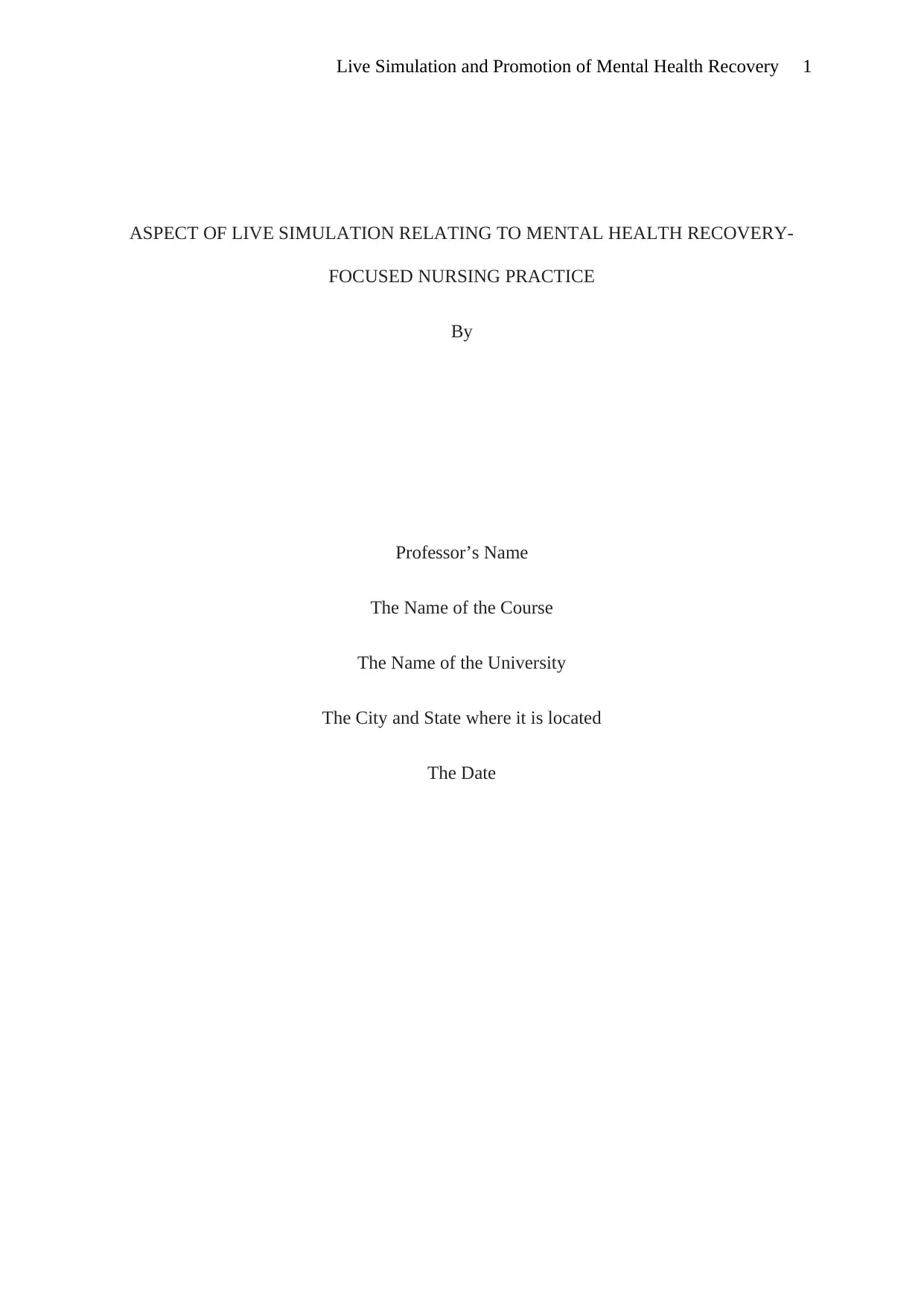
Live Simulation and Promotion of Mental Health Recovery 1
ASPECT OF LIVE SIMULATION RELATING TO MENTAL HEALTH RECOVERY-
FOCUSED NURSING PRACTICE
By
Professor’s Name
The Name of the Course
The Name of the University
The City and State where it is located
The Date
ASPECT OF LIVE SIMULATION RELATING TO MENTAL HEALTH RECOVERY-
FOCUSED NURSING PRACTICE
By
Professor’s Name
The Name of the Course
The Name of the University
The City and State where it is located
The Date
Paraphrase This Document
Need a fresh take? Get an instant paraphrase of this document with our AI Paraphraser
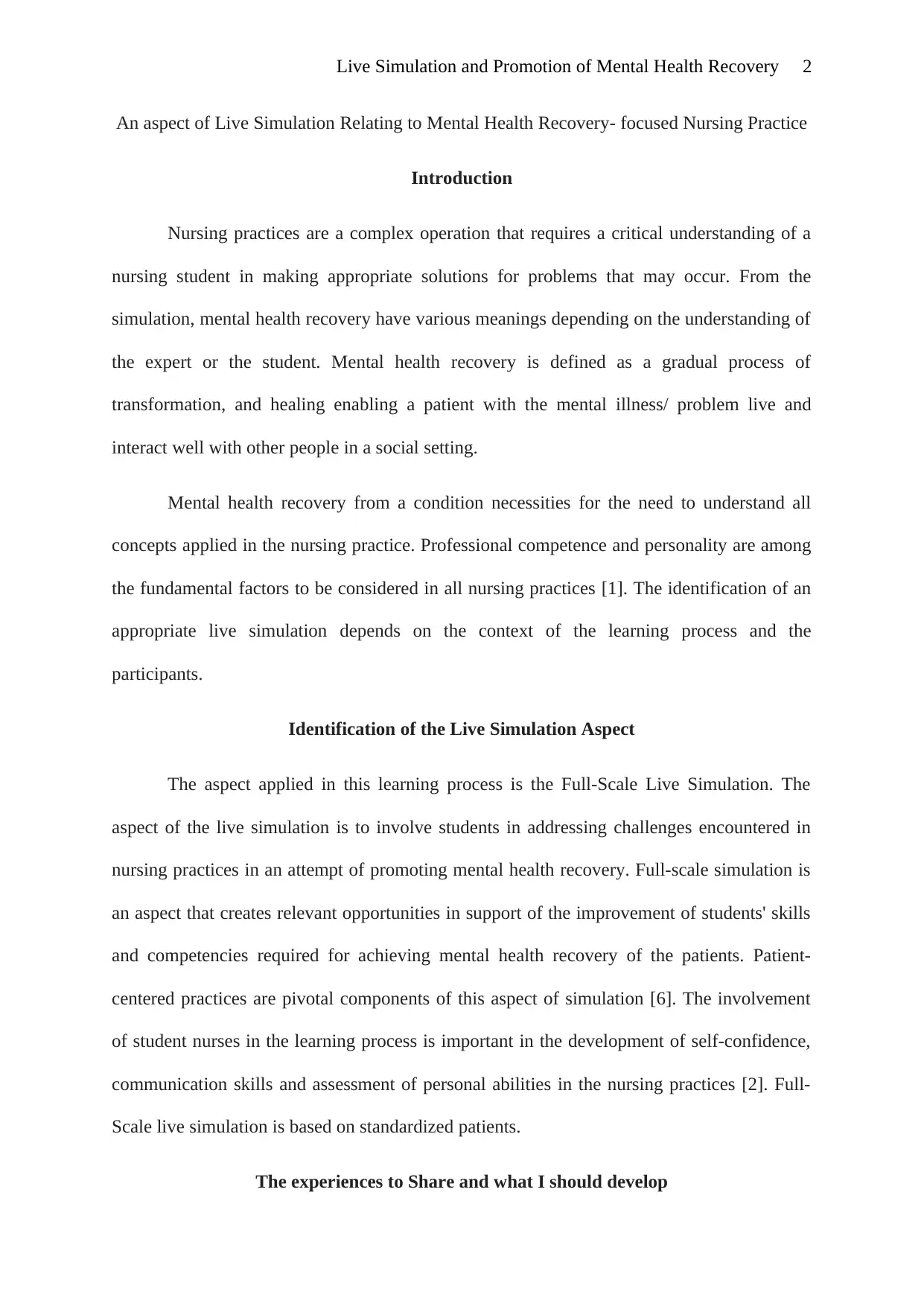
Live Simulation and Promotion of Mental Health Recovery 2
An aspect of Live Simulation Relating to Mental Health Recovery- focused Nursing Practice
Introduction
Nursing practices are a complex operation that requires a critical understanding of a
nursing student in making appropriate solutions for problems that may occur. From the
simulation, mental health recovery have various meanings depending on the understanding of
the expert or the student. Mental health recovery is defined as a gradual process of
transformation, and healing enabling a patient with the mental illness/ problem live and
interact well with other people in a social setting.
Mental health recovery from a condition necessities for the need to understand all
concepts applied in the nursing practice. Professional competence and personality are among
the fundamental factors to be considered in all nursing practices [1]. The identification of an
appropriate live simulation depends on the context of the learning process and the
participants.
Identification of the Live Simulation Aspect
The aspect applied in this learning process is the Full-Scale Live Simulation. The
aspect of the live simulation is to involve students in addressing challenges encountered in
nursing practices in an attempt of promoting mental health recovery. Full-scale simulation is
an aspect that creates relevant opportunities in support of the improvement of students' skills
and competencies required for achieving mental health recovery of the patients. Patient-
centered practices are pivotal components of this aspect of simulation [6]. The involvement
of student nurses in the learning process is important in the development of self-confidence,
communication skills and assessment of personal abilities in the nursing practices [2]. Full-
Scale live simulation is based on standardized patients.
The experiences to Share and what I should develop
An aspect of Live Simulation Relating to Mental Health Recovery- focused Nursing Practice
Introduction
Nursing practices are a complex operation that requires a critical understanding of a
nursing student in making appropriate solutions for problems that may occur. From the
simulation, mental health recovery have various meanings depending on the understanding of
the expert or the student. Mental health recovery is defined as a gradual process of
transformation, and healing enabling a patient with the mental illness/ problem live and
interact well with other people in a social setting.
Mental health recovery from a condition necessities for the need to understand all
concepts applied in the nursing practice. Professional competence and personality are among
the fundamental factors to be considered in all nursing practices [1]. The identification of an
appropriate live simulation depends on the context of the learning process and the
participants.
Identification of the Live Simulation Aspect
The aspect applied in this learning process is the Full-Scale Live Simulation. The
aspect of the live simulation is to involve students in addressing challenges encountered in
nursing practices in an attempt of promoting mental health recovery. Full-scale simulation is
an aspect that creates relevant opportunities in support of the improvement of students' skills
and competencies required for achieving mental health recovery of the patients. Patient-
centered practices are pivotal components of this aspect of simulation [6]. The involvement
of student nurses in the learning process is important in the development of self-confidence,
communication skills and assessment of personal abilities in the nursing practices [2]. Full-
Scale live simulation is based on standardized patients.
The experiences to Share and what I should develop
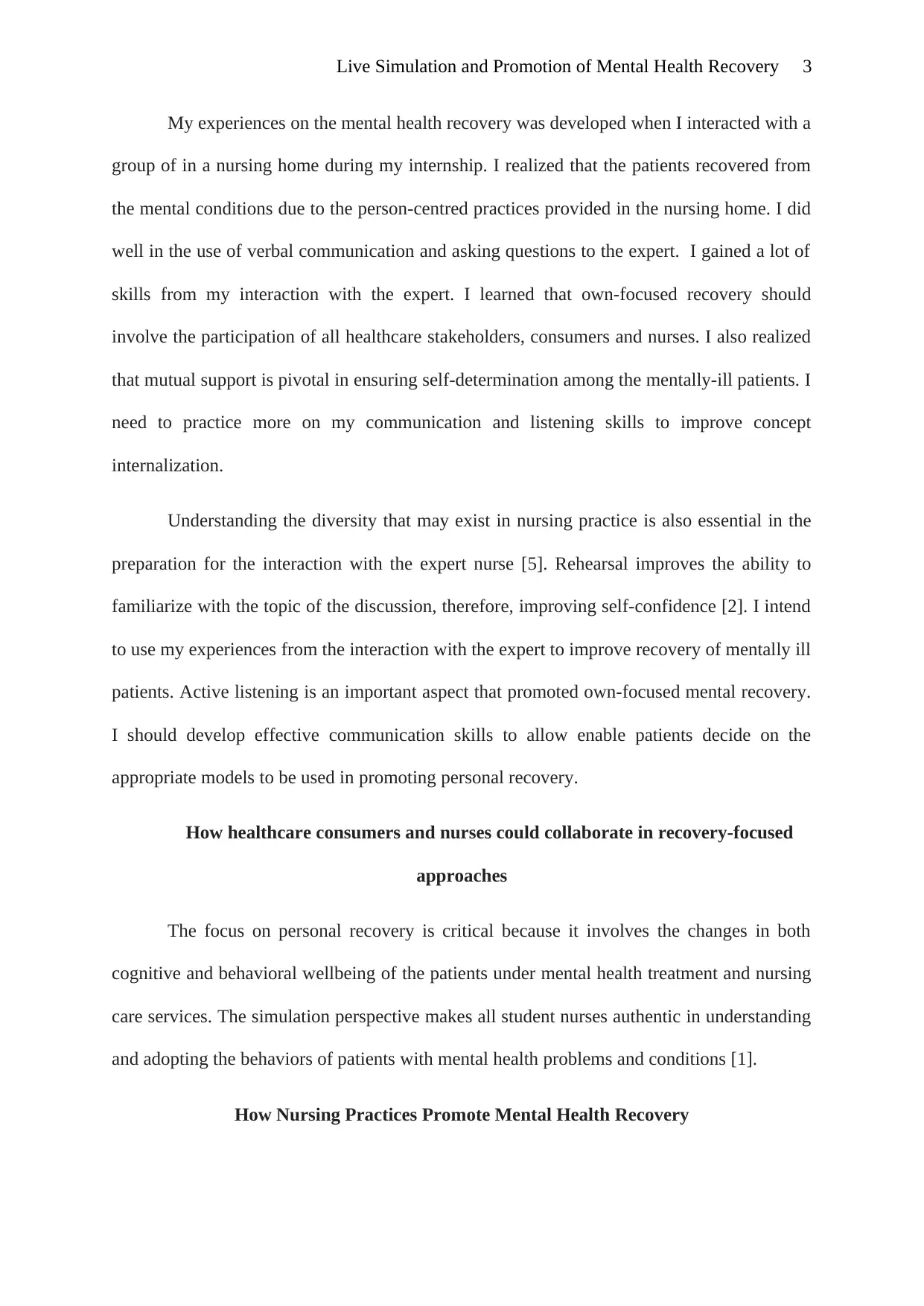
Live Simulation and Promotion of Mental Health Recovery 3
My experiences on the mental health recovery was developed when I interacted with a
group of in a nursing home during my internship. I realized that the patients recovered from
the mental conditions due to the person-centred practices provided in the nursing home. I did
well in the use of verbal communication and asking questions to the expert. I gained a lot of
skills from my interaction with the expert. I learned that own-focused recovery should
involve the participation of all healthcare stakeholders, consumers and nurses. I also realized
that mutual support is pivotal in ensuring self-determination among the mentally-ill patients. I
need to practice more on my communication and listening skills to improve concept
internalization.
Understanding the diversity that may exist in nursing practice is also essential in the
preparation for the interaction with the expert nurse [5]. Rehearsal improves the ability to
familiarize with the topic of the discussion, therefore, improving self-confidence [2]. I intend
to use my experiences from the interaction with the expert to improve recovery of mentally ill
patients. Active listening is an important aspect that promoted own-focused mental recovery.
I should develop effective communication skills to allow enable patients decide on the
appropriate models to be used in promoting personal recovery.
How healthcare consumers and nurses could collaborate in recovery-focused
approaches
The focus on personal recovery is critical because it involves the changes in both
cognitive and behavioral wellbeing of the patients under mental health treatment and nursing
care services. The simulation perspective makes all student nurses authentic in understanding
and adopting the behaviors of patients with mental health problems and conditions [1].
How Nursing Practices Promote Mental Health Recovery
My experiences on the mental health recovery was developed when I interacted with a
group of in a nursing home during my internship. I realized that the patients recovered from
the mental conditions due to the person-centred practices provided in the nursing home. I did
well in the use of verbal communication and asking questions to the expert. I gained a lot of
skills from my interaction with the expert. I learned that own-focused recovery should
involve the participation of all healthcare stakeholders, consumers and nurses. I also realized
that mutual support is pivotal in ensuring self-determination among the mentally-ill patients. I
need to practice more on my communication and listening skills to improve concept
internalization.
Understanding the diversity that may exist in nursing practice is also essential in the
preparation for the interaction with the expert nurse [5]. Rehearsal improves the ability to
familiarize with the topic of the discussion, therefore, improving self-confidence [2]. I intend
to use my experiences from the interaction with the expert to improve recovery of mentally ill
patients. Active listening is an important aspect that promoted own-focused mental recovery.
I should develop effective communication skills to allow enable patients decide on the
appropriate models to be used in promoting personal recovery.
How healthcare consumers and nurses could collaborate in recovery-focused
approaches
The focus on personal recovery is critical because it involves the changes in both
cognitive and behavioral wellbeing of the patients under mental health treatment and nursing
care services. The simulation perspective makes all student nurses authentic in understanding
and adopting the behaviors of patients with mental health problems and conditions [1].
How Nursing Practices Promote Mental Health Recovery
⊘ This is a preview!⊘
Do you want full access?
Subscribe today to unlock all pages.

Trusted by 1+ million students worldwide
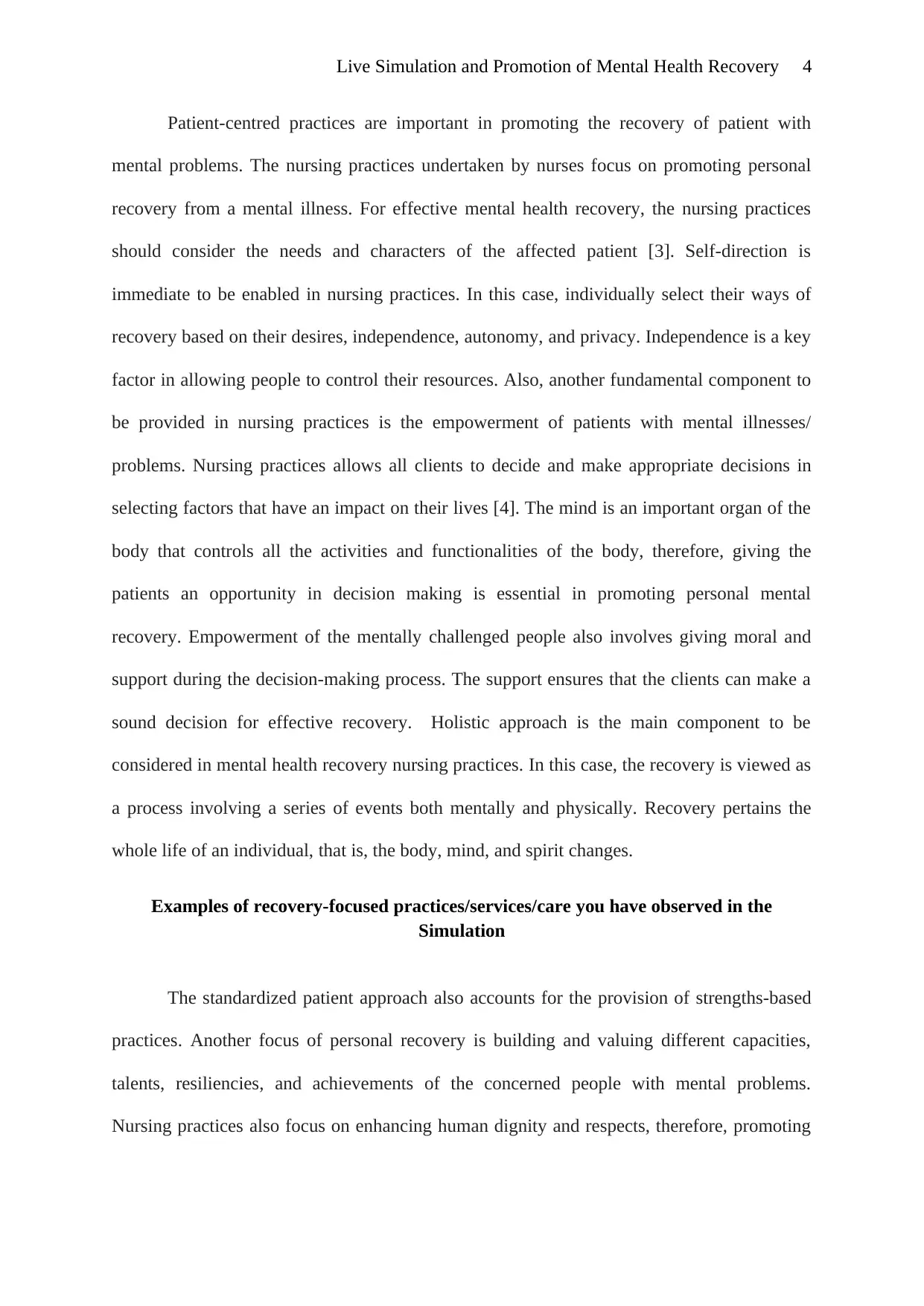
Live Simulation and Promotion of Mental Health Recovery 4
Patient-centred practices are important in promoting the recovery of patient with
mental problems. The nursing practices undertaken by nurses focus on promoting personal
recovery from a mental illness. For effective mental health recovery, the nursing practices
should consider the needs and characters of the affected patient [3]. Self-direction is
immediate to be enabled in nursing practices. In this case, individually select their ways of
recovery based on their desires, independence, autonomy, and privacy. Independence is a key
factor in allowing people to control their resources. Also, another fundamental component to
be provided in nursing practices is the empowerment of patients with mental illnesses/
problems. Nursing practices allows all clients to decide and make appropriate decisions in
selecting factors that have an impact on their lives [4]. The mind is an important organ of the
body that controls all the activities and functionalities of the body, therefore, giving the
patients an opportunity in decision making is essential in promoting personal mental
recovery. Empowerment of the mentally challenged people also involves giving moral and
support during the decision-making process. The support ensures that the clients can make a
sound decision for effective recovery. Holistic approach is the main component to be
considered in mental health recovery nursing practices. In this case, the recovery is viewed as
a process involving a series of events both mentally and physically. Recovery pertains the
whole life of an individual, that is, the body, mind, and spirit changes.
Examples of recovery-focused practices/services/care you have observed in the
Simulation
The standardized patient approach also accounts for the provision of strengths-based
practices. Another focus of personal recovery is building and valuing different capacities,
talents, resiliencies, and achievements of the concerned people with mental problems.
Nursing practices also focus on enhancing human dignity and respects, therefore, promoting
Patient-centred practices are important in promoting the recovery of patient with
mental problems. The nursing practices undertaken by nurses focus on promoting personal
recovery from a mental illness. For effective mental health recovery, the nursing practices
should consider the needs and characters of the affected patient [3]. Self-direction is
immediate to be enabled in nursing practices. In this case, individually select their ways of
recovery based on their desires, independence, autonomy, and privacy. Independence is a key
factor in allowing people to control their resources. Also, another fundamental component to
be provided in nursing practices is the empowerment of patients with mental illnesses/
problems. Nursing practices allows all clients to decide and make appropriate decisions in
selecting factors that have an impact on their lives [4]. The mind is an important organ of the
body that controls all the activities and functionalities of the body, therefore, giving the
patients an opportunity in decision making is essential in promoting personal mental
recovery. Empowerment of the mentally challenged people also involves giving moral and
support during the decision-making process. The support ensures that the clients can make a
sound decision for effective recovery. Holistic approach is the main component to be
considered in mental health recovery nursing practices. In this case, the recovery is viewed as
a process involving a series of events both mentally and physically. Recovery pertains the
whole life of an individual, that is, the body, mind, and spirit changes.
Examples of recovery-focused practices/services/care you have observed in the
Simulation
The standardized patient approach also accounts for the provision of strengths-based
practices. Another focus of personal recovery is building and valuing different capacities,
talents, resiliencies, and achievements of the concerned people with mental problems.
Nursing practices also focus on enhancing human dignity and respects, therefore, promoting
Paraphrase This Document
Need a fresh take? Get an instant paraphrase of this document with our AI Paraphraser
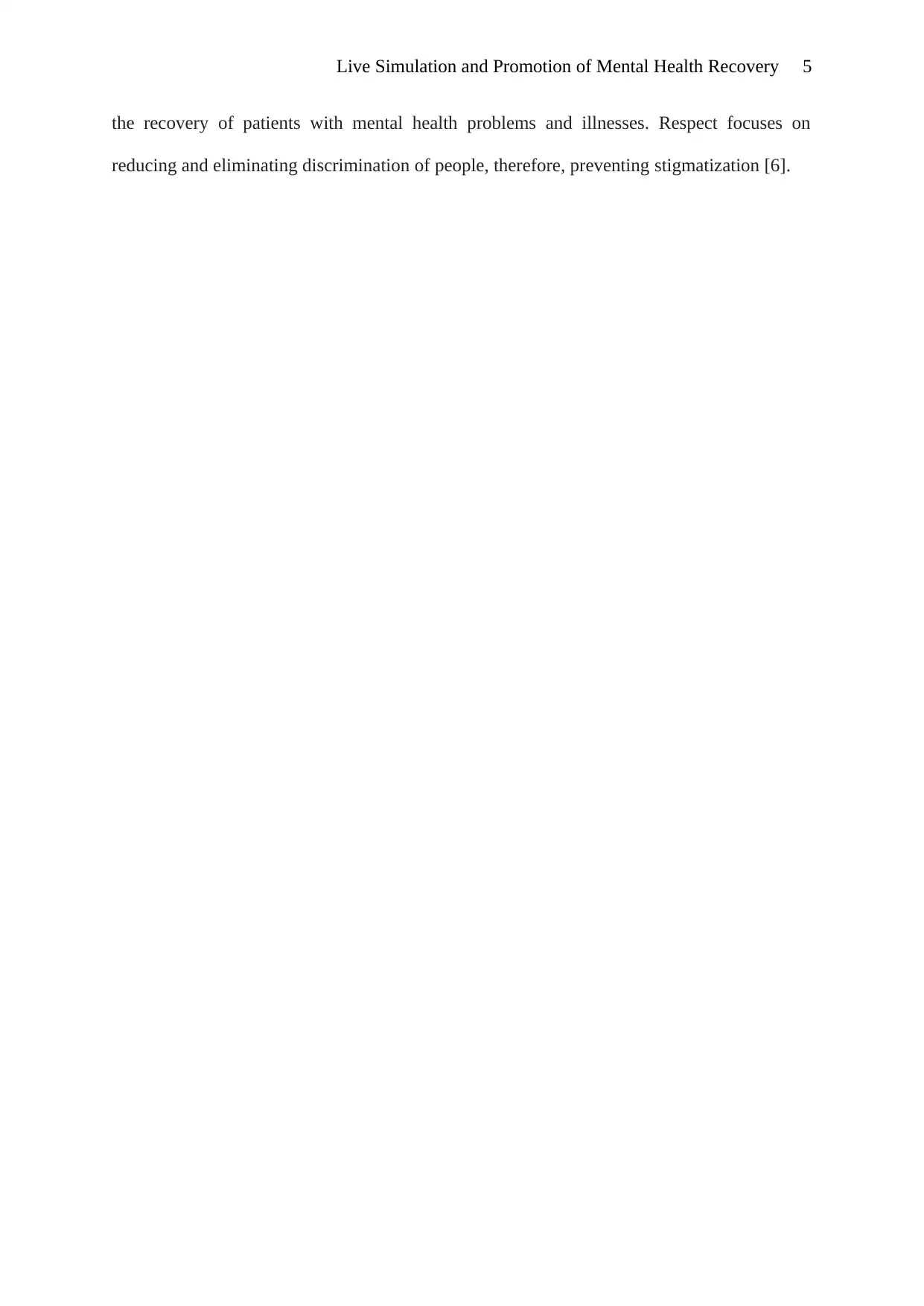
Live Simulation and Promotion of Mental Health Recovery 5
the recovery of patients with mental health problems and illnesses. Respect focuses on
reducing and eliminating discrimination of people, therefore, preventing stigmatization [6].
the recovery of patients with mental health problems and illnesses. Respect focuses on
reducing and eliminating discrimination of people, therefore, preventing stigmatization [6].
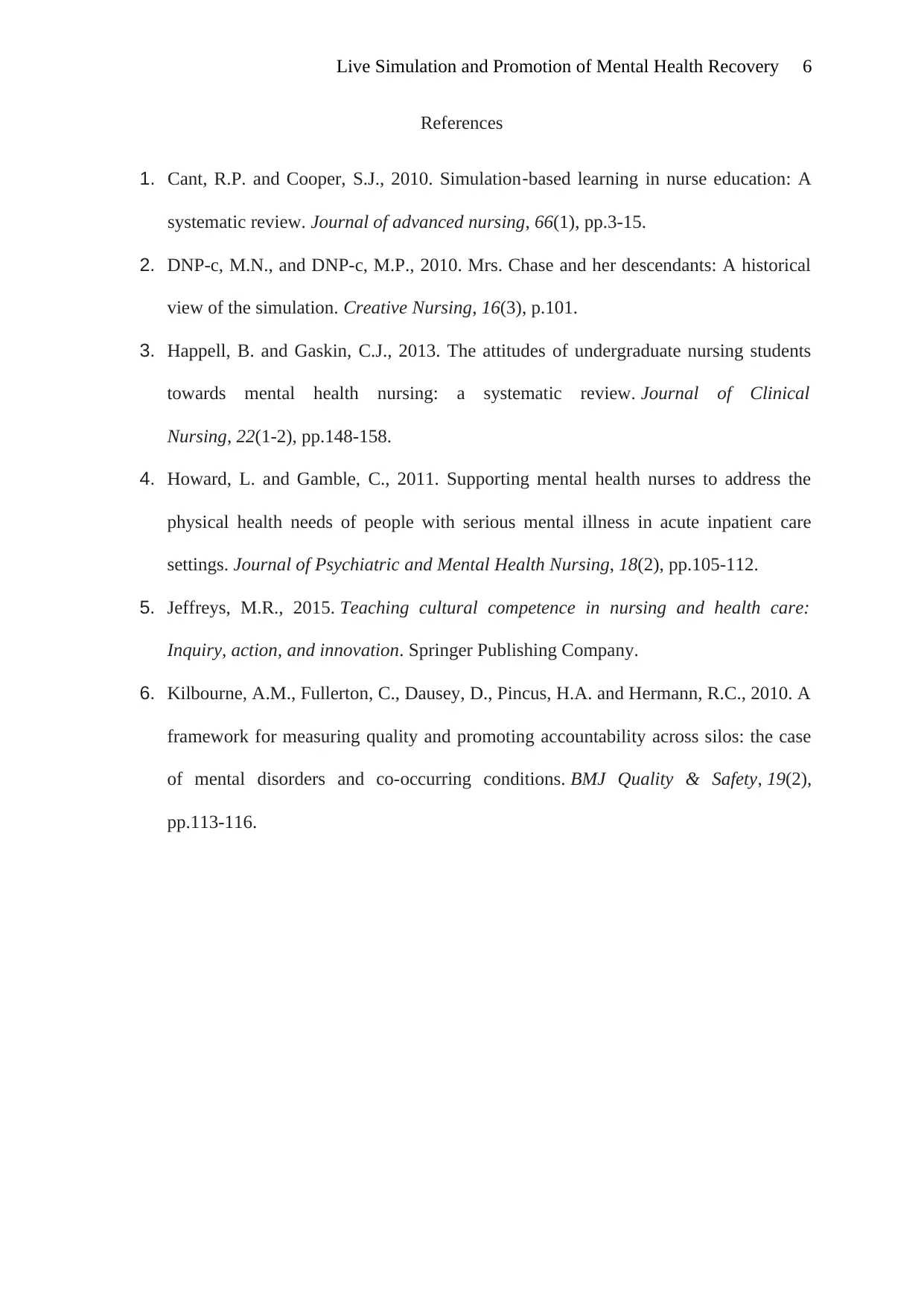
Live Simulation and Promotion of Mental Health Recovery 6
References
1. Cant, R.P. and Cooper, S.J., 2010. Simulation‐based learning in nurse education: A
systematic review. Journal of advanced nursing, 66(1), pp.3-15.
2. DNP-c, M.N., and DNP-c, M.P., 2010. Mrs. Chase and her descendants: A historical
view of the simulation. Creative Nursing, 16(3), p.101.
3. Happell, B. and Gaskin, C.J., 2013. The attitudes of undergraduate nursing students
towards mental health nursing: a systematic review. Journal of Clinical
Nursing, 22(1-2), pp.148-158.
4. Howard, L. and Gamble, C., 2011. Supporting mental health nurses to address the
physical health needs of people with serious mental illness in acute inpatient care
settings. Journal of Psychiatric and Mental Health Nursing, 18(2), pp.105-112.
5. Jeffreys, M.R., 2015. Teaching cultural competence in nursing and health care:
Inquiry, action, and innovation. Springer Publishing Company.
6. Kilbourne, A.M., Fullerton, C., Dausey, D., Pincus, H.A. and Hermann, R.C., 2010. A
framework for measuring quality and promoting accountability across silos: the case
of mental disorders and co-occurring conditions. BMJ Quality & Safety, 19(2),
pp.113-116.
References
1. Cant, R.P. and Cooper, S.J., 2010. Simulation‐based learning in nurse education: A
systematic review. Journal of advanced nursing, 66(1), pp.3-15.
2. DNP-c, M.N., and DNP-c, M.P., 2010. Mrs. Chase and her descendants: A historical
view of the simulation. Creative Nursing, 16(3), p.101.
3. Happell, B. and Gaskin, C.J., 2013. The attitudes of undergraduate nursing students
towards mental health nursing: a systematic review. Journal of Clinical
Nursing, 22(1-2), pp.148-158.
4. Howard, L. and Gamble, C., 2011. Supporting mental health nurses to address the
physical health needs of people with serious mental illness in acute inpatient care
settings. Journal of Psychiatric and Mental Health Nursing, 18(2), pp.105-112.
5. Jeffreys, M.R., 2015. Teaching cultural competence in nursing and health care:
Inquiry, action, and innovation. Springer Publishing Company.
6. Kilbourne, A.M., Fullerton, C., Dausey, D., Pincus, H.A. and Hermann, R.C., 2010. A
framework for measuring quality and promoting accountability across silos: the case
of mental disorders and co-occurring conditions. BMJ Quality & Safety, 19(2),
pp.113-116.
⊘ This is a preview!⊘
Do you want full access?
Subscribe today to unlock all pages.

Trusted by 1+ million students worldwide
1 out of 6
Related Documents
Your All-in-One AI-Powered Toolkit for Academic Success.
+13062052269
info@desklib.com
Available 24*7 on WhatsApp / Email
![[object Object]](/_next/static/media/star-bottom.7253800d.svg)
Unlock your academic potential
Copyright © 2020–2026 A2Z Services. All Rights Reserved. Developed and managed by ZUCOL.





